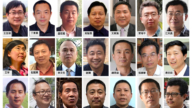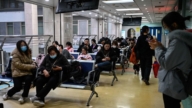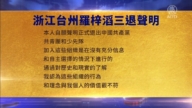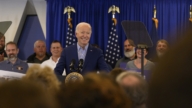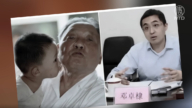【新唐人2013年11月18日訊】中共密不透風的三中全會閉門會議結束後,被外界評論沒有兌現改革承諾。週五,中共全面深化改革的決定也匆匆出爐,被稱為毫無新意。就所謂農村土地改革而言,專家認為,新公布的決定,只不過把以前的強佔土地現象政策化,為裙帶集團到農村圈地撐起了保護傘。而真正意義上的土地改革,應該是把土地還給農民。
《中共中央關於全面深化改革若干重大問題的決定》,開篇就用「決心之大」、「變革之深」、「影響之廣」,「前所未有」,「舉世矚目」等諸多充滿「偉光正」的優美詞句,把《決定》本身讚美了一番。不過外界認為,撇開中共歷來雷聲大雨點小的作風,單就文字而言也談不上改革。
所謂的《決定》第6條29款寫道,堅持農村土地集體所有權,維護農民土地承包經營權,發展壯大集體經濟。穩定農村土地承包關係並保持長久不變。
大陸《農產品市場週刊》網站負責人黃良天:「不看好,不看好,沒有所謂的改革,只要堅持農村土地的集體所有制,這就沒有改革可言,共產黨掌權以後,一直用集體這個名義,掠奪很多東西變成自己的黨產,現在農民從黨裡頭承包土地,變成共產黨把土地資源全給佔了,它想給誰就給誰,給你多少年,就給多少年。」
《決定》第3條第11款寫道,建立城鄉統一的建設用地市場。在符合規劃和用途管制前提下,允許農村集體經營性建設用地出讓、租賃、入股。
大陸《農產品市場週刊》網站負責人黃良天擔心,如此下去,中國農村的土地只能種鋼筋水泥,而不能種糧食。
黃良天:「那麼現在這個決定一出來,就把模糊的產權變得很明晰了,跟城市郊區的土地一樣照樣可以賣。誰來賣﹖誰有這個支配權﹖沒有說,沒有說呢,像往常一樣就是政府,或者政府在農村的所謂組織的帶頭人—黨支部書記。農民個體而言,面對的環境更加險惡了。」
中國專欄作家朱智勇在他的微博中寫道,偉大的土地改革又要開始了,在經歷了一輪殘酷的城市圈地運動之後,農民的土地再一次被系統瞄準。……不在人生權利上做出改變,眼睛盯著他們那一點可憐的土地,用心何在?政府能承諾流轉收益全部歸農戶嗎?
今年春天,中共黨媒《農民日報》刊登了一篇題為《沒有土地的村莊,誰來為失地農民買單》的文章。文章中詳細的描述了一開發區領導,動員土地承包者集體簽訂了土地流轉委託書,幾年後,又變相收回了村民還有16年承包期的土地使用權和經營權,再以每畝加200元的價格,把後面的租期倒賣給了地產商。
當地領導利用恐嚇、欺詐、強壓、各種軟硬兼施的方法,用土地流轉的方式圈走整個村莊土地,導致整個村莊土地閒置,綠色的田野裸露在外,農民無法謀生。
黃良天:「一個黨的會議,你怎麼能支配農村的土地呢﹖只要中央一出一個甚麼旗號或口號,就有一大批跟政府有勾結的商家,去農村奪取土地資源,現在已經非常嚴重了。」
而各地通過打死、甚至活埋等方式,強搶農民土地的現象,更是屢見不鮮。
黃良天指出,只有把本來屬於農民的土地還給農民,實現土地私有化才能從根本上解決問題。
「北京師範大學」MBA導師段紹譯告訴《新唐人》,圈地現象肯定存在,但是中共很懼怕私有化。
大陸經濟學家華生最近接受媒體採訪時說,土地改革是為幾億進城農民工安居服務的,為留下來務農的農民服務的,不是為資本下鄉圈地服務,不是為地方政府和官員好大喜功服務,這就是試金石。
採訪編輯/劉惠 後製/葛雷
New Land Reform Becomes Protection of “Enclosure Movement” in Rural Areas!?
Following the closed-door Third Plenary session, the Chinese
Communist Party has been widely criticized for not
fulfilling its previous promises on reform.
In the face of heavy criticism, the party hastily released
the so-called “reform decision” document but still
received little recognitions.
Specifically, experts say that the recent rural land reform
“decision” is no more than policy giving official protection to
interest groups who forcibly seize lands from peasants.
Any real land form must return land ownership to peasants.
The CCP has announced it’s document of the “Decision of
the CCP Central Committee on Several Important Issues of
Comprehensively Deepening Reform”.
From the start, the document uses flashy terms such as
“unprecedented”, “huge determination”, “deep reform”, “wide
influence”, and “focus of world attention” to glorify itself.
However, outsiders say that even putting aside the party’s
tradition of “much said and little done”,
the “Decision” still fails to amount to real reform.
In Article 6, Paragraph 29 of the “Decision”, it says
“Stick to collective ownership of rural lands”,
“Protect peasant’s rights of land contracting”
and “Develop collective economy”.
The party wants to maintain control of and continue
the current land contracting system in rural areas.
Huang Liangtian, director of Chinese website Farmers’
Market Weekly: “I don’t like it. There is no real reform as long
as the collective ownership of rural lands does not change.
Since taking power the CCP has always been plundering
properties for itself via “collectivization”.
Now peasants have to contract with the party for land use.
The party has occupied all land resource and it can give it
to anyone for any time span at will.”
In Article 3, Paragraph 11 of the “Decision”, it says
“Construct a unified land market for construction”,
“Permit transfer, leasing and sharing of collective-owned
farm lands for construction without violation of planning
and use control.”
Huang Liangtian, director of blocked Chinese website
Farmers’ Market Weekly, worries that following that policy
all farm lands in China will only end up
“growing” reinforced concrete instead of crops.
Huang Liangtian: “The announced ‘Decision’ now makes
the previously unclear property rights become clear,
allowing rural land to be sold like urban land.
Who will sell them? Who has the authority to do that?
This is not mentioned.
Therefore the answer is just as usual: governments or
leaders of their rural agencies, the party branch secretaries.
For individual peasants, they are now facing
an even worse situation.”
Chinese column writer Zhu Zhiyong wrote the following
on Weibo: “Another round of great land reform has begun.
After a series of cruel land grabs in cities,
now peasants’ lands have become the next target…
What is the motive of aiming at those poor people’s
only property without improving their rights?
Can the authorities promise to give all interests from land
transfers to rural residents?”
This spring, party mouthpiece Farmers’ Daily published
an article titled “Villages without lands: Who will pay
the bill for peasants?”
The article told the following story in detail. A leader of
an economic development zone persuaded local land
contractors to collectively sign a “letter of authorization
for land transfer”.
Several years later, he secretly retracted villagers’ remaining
16 years of land use and management rights.
Finally, the official sold those tenancy periods to developers
at a price of 200 yuan per mu (about $192 per acre).
Local leaders managed to grab all lands of the village
via land transfer operations accompanied by intimidation,
deception, suppression and every other possible means.
Finally all lands of the village were left unused,
with green fields untended and farmers unable make a living.
Huang Liangtian: “How can a party meeting decide how
to use rural lands?
Once the CCP’s Central Committee says something, a large
group of crony enterprises will flock to seize
rural land resources. This problem has now become very serious.”
Moreover, it is not rare to see peasants being beaten to
death or even buried alive when they resist forcible land
expropriation all over China.
Huang Liangtian says that the only solution to solve
the problem is to return land ownership to peasants
and implement land privatization.
Duan Shaoyi, an MBA instructor of Beijing Normal University,
told NTD that the lad grab phenomenon definitely exists, but
the CCP is very afraid of implementing land privatization.
Chinese economist Hua Sheng recently said in an interview
that land reforms should serve for the country’s hundreds of
millions of peasant workers in cities and farmers.
It should not serve to aid in rural land grabs for capital,
or aid local governments and their officials in making
unrealistic achievements.
In this sense, this issue is a real test to the party leaders.




